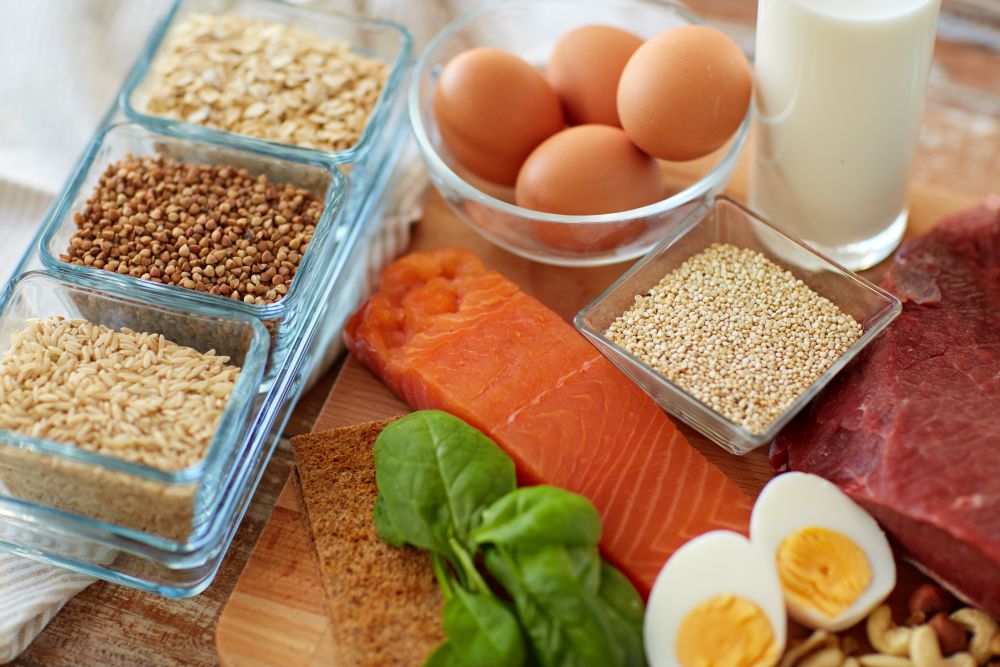How much protein should I eat per day?

The amount of protein you should consume daily depends on your age, how fast your body is growing, your physical activity and your health. The protein demand is different for a pregnant woman, an endurance athlete and a person training to gain pure muscle mass. Find out how much protein you should eat per day and why covering your protein requirements is important.
Protein requirements - why is protein important for the body?
The human organism is made of proteins, which on average represent 20% of body weight, i.e. around 10-15 kg. Proteins are constantly being broken down and replaced by new ones. Up to 300 g of new proteins are formed in the human body every day. However, the body is not able to produce all the proteins it requires, so the daily demand for protein has to be provided through the diet. Proteins are formed from amino acids linked by peptide bonds, and to a large extent, the type of amino acid is responsible for how much protein you need to supply each day.
Amino acids are divided into:
- exogenous (essential), that the human body does not produce, and their source is food. They are lysine, methionine, threonine, leucine, isoleucine, valine, tryptophan, phenylalanine; and according to some classifications also histidine.
- endogenous produced by the body – alanine, asparagine, aspartic acid, glutamic acid and serine.
- conditionally exogenous (conditionally essential), which the body synthesises but needs appropriate amounts of exogenous amino acids to do it. These are arginine, cysteine, glutamine, glycine, proline and tyrosine.
To answer the question of how much protein a day should be supplied to the body, we should primarily focus on the sources of essential amino acids. Their quantity in the diet determines whether the demand for protein is covered or not. In the case of a deficiency of essential amino acids in meals, there is also a problem with the synthesis of amino acids that are conditionally necessary, which may lead to serious health consequences.
How much complete and incomplete protein per day?
Due to the amount and proportion of exogenous amino acids in foods, proteins are divided into complete and incomplete sources. A complete protein provides all essential amino acids in the right proportions. Its sources are products of animal origin. It is easy to meet your protein requirements from exogenous protein sources. On the other hand, an incomplete protein is a type in which one or more essential amino acids are missing, or are present to each other by proportions, which make their correct utilisation by the organism impossible. In this case, we are talking about limiting amino acids, i.e. those that are the least in the food product and block the use of the other amino acids. Vegetable proteins are considered to be incomplete proteins..
Would that mean that vegans on a typical plant-based diet are unable to meet their protein needs? No, this is not true. You can cover your protein requirements by eating only plant-based protein sources. However, you need to know how to combine them in your meals to supply the missing amino acids. For example, legumes are a great source of lysine, but they contain little methionine. On the other hand, cereals contain more methionine, which is why combinations such as rice and red beans, hummus and bulgur porridge, or red lentil paste with bread enable us to complement each other's limiting amino acids and increase the absorption of protein.
According to official recommendations, a typical diet should cover at least 50% of its protein requirements with products of animal origin.
Recommended protein supplements
Daily protein requirement
The amount of protein you should eat per day is determined by various factors. The number of grams of protein per kilogram of body weight depends on::
- physiological state and age – infants, children, adolescents, pregnant and breastfeeding women are groups of people whose daily protein requirements are higher due to intensive growth and the formation of new cells and tissues, not just the renewal of existing ones.
- health status – during illness, the breakdown of body proteins is higher, and during periods of recovery, protein synthesis increases to make up for previous losses. In such cases, more protein per kg of body weight should be eaten.
- Physical activity – the higher the physical activity, the more grams of protein per day should be provided due to the increase in muscle mass and repair of muscle damage.
How many grams of protein per kg body weight - protein intake standards for the Polish population
| Group (gender, age [years]) | Recommended Dietary Allowance (RDA) for protein [g/kg body weight] |
| Infants | |
| 0 - 0,5 | data not available |
| 0,5 - 1 | data not available |
| Children | |
| 1 - 3 | 1,17 |
| 4 - 6 | 1,10 |
| 7 - 9 | 1,10 |
| Boys | |
| 10 - 12 | 1,10 |
| 13 - 15 | 1,10 |
| 16 - 18 | 0,95 |
| Men | |
| ≥ 19 | 0,95 |
| Girls | |
| 10 - 12 | 1,10 |
| 13 - 15 | 1,10 |
| 16 - 18 | 0,95 |
| Women | |
| ≥ 19 | 0,95 |
| pregnancy | 1,20 |
| lactation | 1,45 |
Mass and reduction - how much protein per kg of bodyweight?
Protein is especially relevant in the diet of athletes. Depending on the sport and physique goals, the number of proteins changes. The demand for protein among athletes increases, because during exercise, part of the energy is obtained from the protein breakdown. In addition, each physical activity causes damage to muscles and forces their regeneration, moreover, in sports where the aim is gaining muscle mass the daily requirement for protein is even higher.
In stamina sports such as running, cycling or swimming, 1.2 - 1.4 g of protein per kilogram of body weight per day is recommended. The increased demand for protein is caused by the fact that after about 60 minutes of training, glycogen stores are used up, so the body produces more and more energy from protein. Losses resulting from the breakdown of muscle proteins for energy and mechanical damage to proteins must be supplemented with diet.
Strength athletes should eat more - 1.4 - 1.8 g of protein per kg of body weight, as the breakdown of proteins through resistance training is higher than during endurance training.

How much protein for mass and reduction?
How much protein should I eat to gain mass? When the bodybuilding goal is increasing muscle mass with resistance training, it is recommended to take 2 - 2.5 g of protein per kg of body weight. This is the amount that ensures a positive nitrogen balance and allows for muscle growth. Research shows that consuming protein in higher quantities does not translate into better results in strength sports and higher muscle protein synthesis. However, remember that the body does not use protein only for muscle synthesis. If we eat more of it, it will at least partly be used for hundreds of processes other than muscle anabolism.
How much protein for weight loss? The reduction of body fat occurs more efficiently with an increased proportion of protein together with resistance training, and not, as has been thought for years, only in combination with cardio training, which burns a lot of calories in a short time. Although resistance training burns fewer calories in a single period, the effect of accelerated metabolism lasts up to several hours after the training, which consequently makes it very effective for burning fat. How much protein should I eat daily on a weight loss diet? The recommended amount is 1.8 - 2.0 g of protein per kg of body weight. Reduced calorie meals and less energy from carbohydrates mean that protein breakdown increases as the body uses it for energy. In the case of intensive resistance exercise, when we want to lose body fat and gain muscle mass at the same time, we can increase the intake to 2.5 g of protein per kg of body weight.

